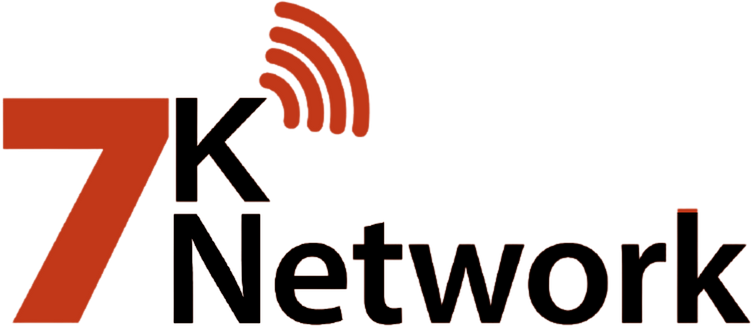A single online review can make or break a sale, especially for small businesses competing in crowded markets. With over 98% of consumers reading online reviews before making a purchase, managing your brand’s digital reputation is no longer optional, it’s essential. Whether it’s a glowing five-star rating on Google or a critical comment on Facebook, every piece of online feedback shapes how customers perceive your business.
However, here’s the challenge: reviews, mentions, and social chatter occur across dozens of platforms, often in real-time. Manually monitoring and responding to all of it is time-consuming and nearly impossible without the right tools. That’s where online reputation management tools come in.
These platforms are designed to help small businesses: monitor online reviews and social mentions, respond quickly to customer feedback, improve local SEO, and build long-term brand trust. In this blog, we explore the top ORM tools tailored for small businesses that are affordable, scalable, and packed with features that let you take control of your brand narrative.
Why Online Reputation Is Critical for Small Business Success
Your online reputation can either fuel your business growth or quietly hold it back. For small businesses, where every customer counts, what people say online often becomes the deciding factor for new customers. Whether it’s a Google review, a Facebook comment, or a rating on Yelp, these opinions shape trust before a person even visits your store or website.
Here’s why reputation management should be a top priority:
- First impressions happen online – Most people check reviews before contacting a business. A negative or outdated presence can instantly turn them away.
- Trust drives conversions – Positive reviews make your business more trustworthy, which directly impacts leads, sales, and word-of-mouth.
- Search engines rank trusted businesses higher – Google uses review signals and business credibility as local SEO ranking factors.
- Bad feedback spreads quickly – A single complaint, if ignored, can snowball into long-term damage.
- Customers expect responses – Today’s customers expect businesses to reply to reviews—good or bad. Not responding can seem careless.
- Good reputation builds loyalty – Businesses with active, transparent reputations tend to keep customers longer and turn them into repeat buyers.
Key Functions to Look for in an Online Reputation Tool
Not all online reputation management tools are created equally. Choosing the right one depends on your business size, customer base, industry, and how active your online presence is. Still, there are a few core features every small business should prioritize.
- Multi-Platform Monitoring – Track reviews and mentions across Google, Facebook, Yelp, TripAdvisor, and more from one dashboard.
- Automated Review Requests – Send review invites via email or SMS after a customer interaction to increase review volume.
- Real-Time Alerts – Get notified instantly when someone leaves a review or mentions your brand, so you can respond quickly.
- Sentiment Analysis – Use AI to understand customer emotions and identify trends in feedback.
- Listings Management – Keep your business details accurate across directories to boost local SEO.
- Review Response Tools – Respond directly from the platform or use AI-suggested replies to save time.
- Integration Options – Sync with CRM software, POS systems, or booking tools for automated review workflows.
- Social Media Listening – Monitor brand mentions, hashtags, and comments across social channels.
- Analytics & Reporting – Measure review trends, customer satisfaction scores, and overall reputation health.
List of 15 Online Reputation Management Tools for Small Businesses
1. Birdeye
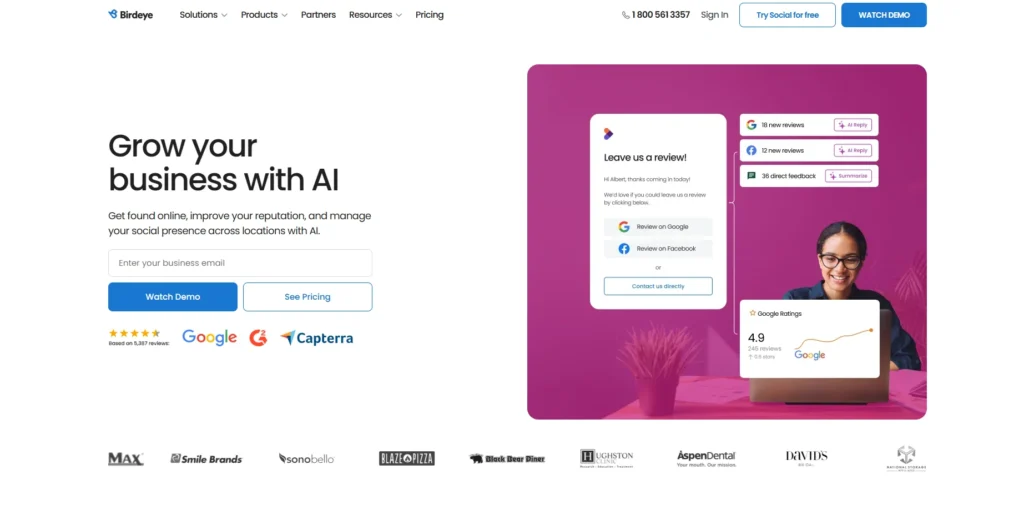
Website: https://birdeye.com
Birdeye is an all-in-one reputation management platform, ideal for small and local businesses. The platform streamlines the process of collecting, monitoring, and responding to customer reviews from 200+ sites. Birdeye leverages AI for sentiment analysis and automates both review requests and responses, improving online ratings and service feedback.
Its dashboard centralizes surveys, listings, and communications, making online reputation management efficient. Integration with major platforms like Google and Facebook amplifies reach and engagement. Powerful analytics and reporting provide actionable insights and competitive benchmarking to inform business strategies.
Key Features:
- AI-powered review and sentiment analysis
- Automated review requests via SMS/email
- Centralized customer communication dashboard
- Real-time alerts and response automation
- Local SEO and listings management
- Multi-site review, monitoring, and analytics
Pricing: Custom plans for advanced features and larger businesses.
Pros & Cons:
| Pros | Cons |
| User-friendly, all-in-one platform | Pricing may be high for very small businesses |
| Robust integrations (Google, Facebook) | Customization can be limited on basic plans |
| Actionable analytics and benchmarking | Occasional delays in support for large users |
| Streamlined review generation |
2. Podium
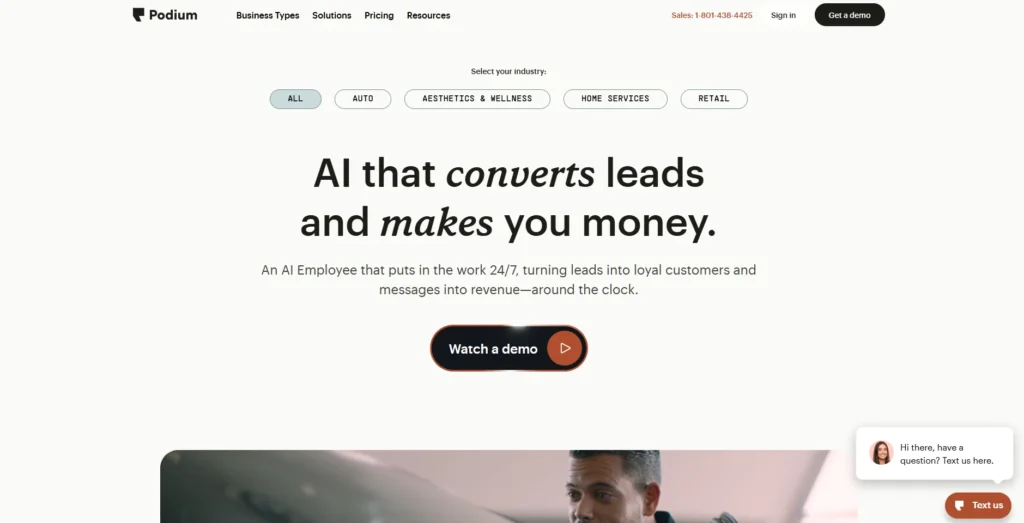
Website: https://www.podium.com
Podium is designed to boost local business reputation through streamlined SMS-based customer engagement. The platform centralizes reviews, feedback, and messages in a single dashboard, simplifying workflows. In addition to review requests, Podium offers payment solutions and webchat tools to facilitate customer communication and lead generation.
Its intuitive interface accelerates Google review acquisition and enhances customer interactions. The system is especially popular in service industries like healthcare, auto, and restaurants, where local search reputation is critical. Real-time alerts and analytics further support rapid, data-driven decisions.
Key Features:
- SMS-based review requests and feedback collection
- Centralized inbox for all customer communications
- Webchat for live customer interaction
- Payment processing integration
- Automated review invites
- Analytics and performance tracking
Pricing: Custom, contact sales for a quote.
Pros & Cons:
| Pros | Cons |
| Fast and effective Google review boosting | Can become expensive for expanding needs |
| Centralized, intuitive dashboard | Pricing not transparent |
| Includes webchat and payments | Mostly targets local businesses |
| Real-time messaging and alerts |
3. Mention
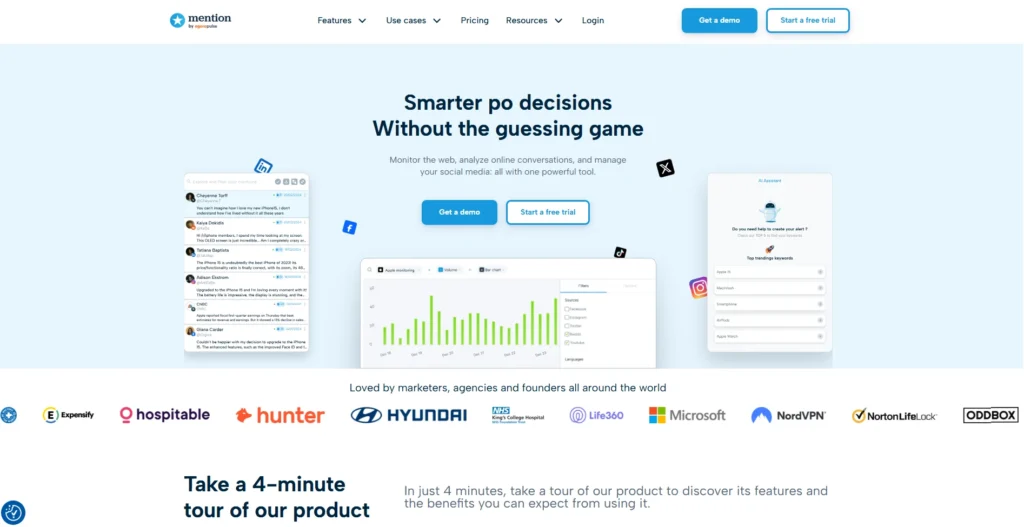
Website: https://mention.com
Mention delivers comprehensive, real-time monitoring for your brand across social media, news, blogs, and forums. Using AI, it analyzes sentiment and notifies you immediately of spikes or emerging trends, allowing your business to address reputation issues quickly. Its competitive analytics compare your brand against others, informing smarter PR and marketing moves.
Mention’s robust dashboard is suitable for both beginners and advanced users seeking to stay ahead of public perception. The tool is scalable, fitting various business sizes and industries. Automated reporting also saves valuable time for busy teams.
Key Features:
- Real-time brand mention tracking
- AI-driven sentiment and volume analysis
- Customizable alerts
- Competitor benchmarking tools
- Influencer tracking
- Automated, customizable reports
Pricing: Free plan available; paid plans start from $499/month.
Pros & Cons:
| Pros | Cons |
| Real-time, comprehensive monitoring | Advanced features cost extra |
| Accessible dashboard | Learning curve for analytics |
| Scalable for all business sizes | Setup for custom alerts needed |
| Good for influencer and competitor tracking |
4. Brand24
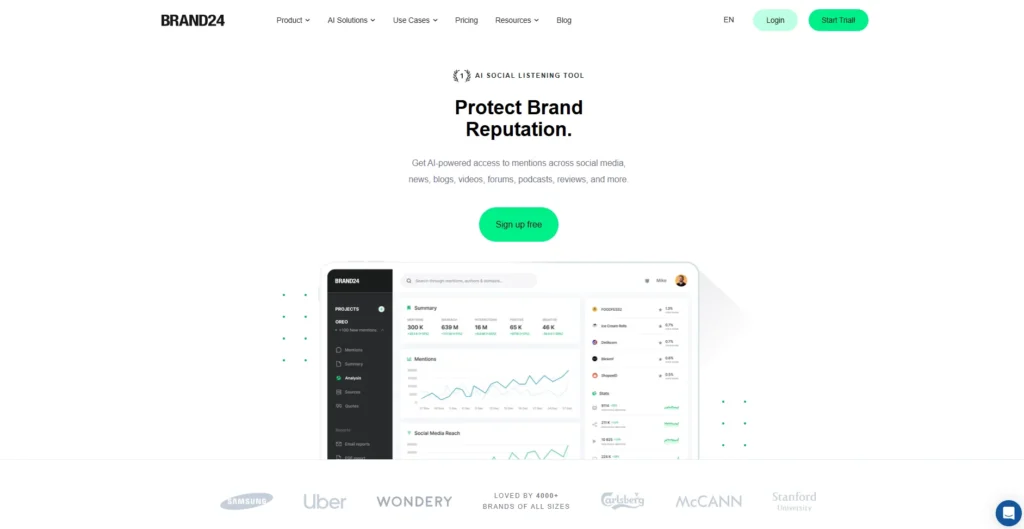
Website: https://brand24.com
Brand24 offers small businesses real-time monitoring across millions of sources: social, blogs, forums, and news. Advanced sentiment analysis helps businesses quickly identify both praise and dissatisfaction, enabling timely responses. The platform’s collaborative tools let teams comment and generate shareable, in-depth reputation reports. Brand24’s user-friendly dashboard and automated alerts make it ideal for businesses aiming for proactive online presence management.
Its historical data and trending analytics inform long-term PR and marketing strategies. Easy integration with social media further supports customer engagement.
Key Features:
- 24/7 real-time monitoring (25M+ sources)
- Detailed sentiment analysis
- Automated alerts for brand mentions
- Historical data and trend analysis
- Team collaboration and project management
- Customizable reputation reports
Pricing:
- Individual: $199 per month
- Team: $299 per month
- Pro: $399 per month
- Business: $599 per month
- Enterprise: Starts from $999 per month
Pros & Cons:
| Pros | Cons |
| Extensive real-time coverage | Entry price could be limiting for micro-businesses |
| Powerful sentiment and trend analysis | Some advanced analytics in higher tiers only |
| Team collaboration features | |
| Automated reports and alerts |
5. Google Alerts
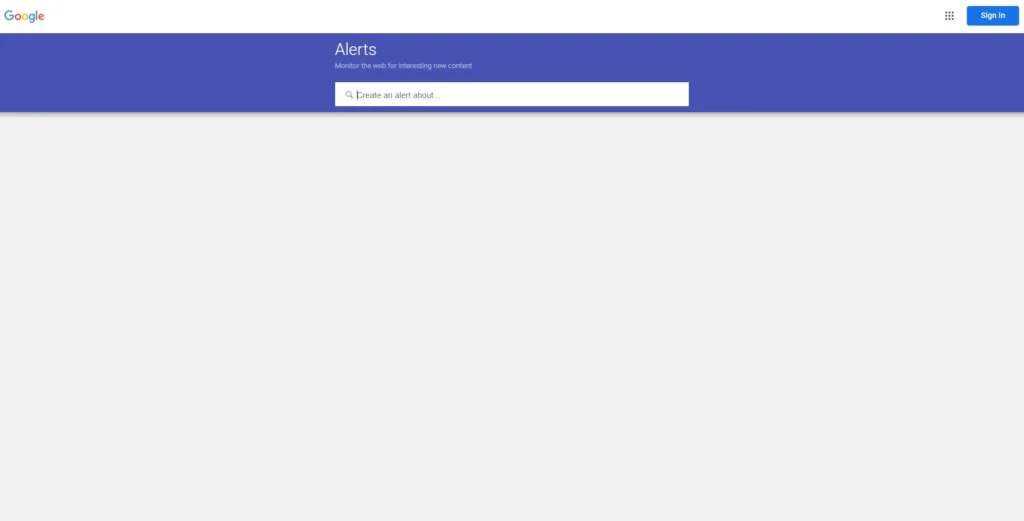
Website: https://www.google.com/alerts
Google Alerts is a free tool that keeps you updated whenever your business name appears across the internet, including news, blogs, and websites. Setting up alerts is fast, simply input the keywords and select how often you want to receive email notifications. Although it doesn’t offer sentiment analysis or review management, Google Alerts is invaluable for micro-businesses or those starting with online reputation management.
It’s a reliable way to catch mentions early and react quickly to customer feedback or media attention. The minimalist approach makes it accessible and easy for all.
Key Features:
- Brand mention notifications via email
- Coverage of news, blogs, forums, and web pages
- Simple, user-friendly setup
- Allows multiple alerts for different keywords
- Completely free with a Google account
- Real-time or summary notifications
Pricing: Free
Pros & Cons:
| Pros | Cons |
| Free to use and easy to set up | Lacks sentiment analysis and dashboards |
| Instant notifications | No review request functionality |
| Can monitor multiple keywords | Limited depth for comprehensive needs |
| Good starting point for beginners |
6. Sprout Social
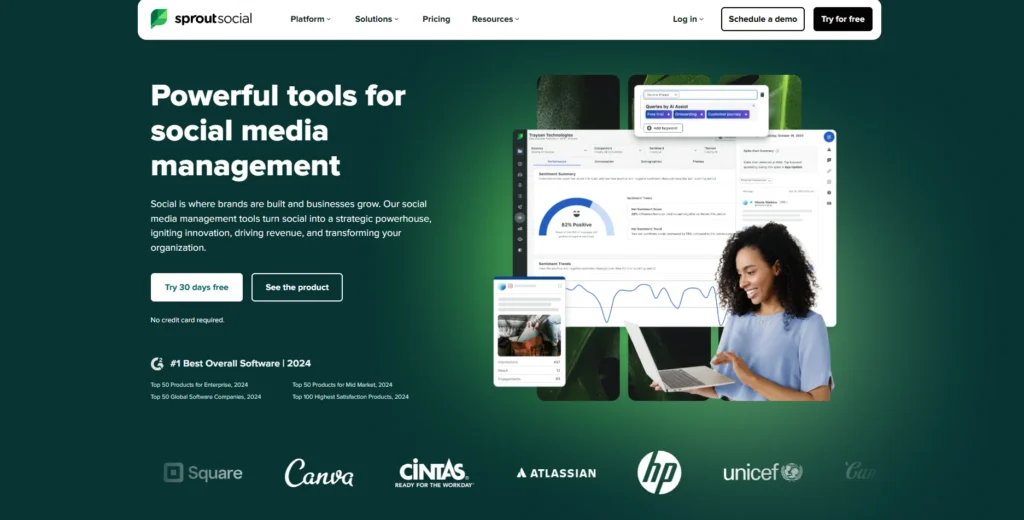
Website: https://sproutsocial.com
Sprout Social combines social media management, real-time review tracking, and advanced analytics in one platform. Suitable for small businesses and agencies, it streamlines scheduling content, engaging with customers, and monitoring feedback for a unified reputation strategy. As a set of powerful social media scheduling tools, it also offers AI-powered features like chatbots and sentiment analysis for automation and crisis prevention.
As one of the leading social media analytics tools, Sprout Social provides deep insight into customer engagement, helping businesses refine marketing and PR efforts. The platform also supports collaboration among marketing teams and delivers custom reports for executive insights.
Key Features:
- Multi-platform social media management
- Real-time review and message tracking
- AI-powered chatbots and sentiment analysis
- Post scheduling and workflow automation
- Team collaboration and content approval
- Comprehensive analytics and reporting
Pricing:
- Standard: $199 per month
- Professional: $299 per month
- Advanced: $399 per month
- Enterprise: Custom Pricing
Pros & Cons:
| Pros | Cons |
| All-in-one social and review management | Higher entry-level cost |
| Intuitive, collaborative dashboard | Some advanced features in premium plans |
| AI tools for automation | |
| Strong analytics and reporting |
7. Trustpilot
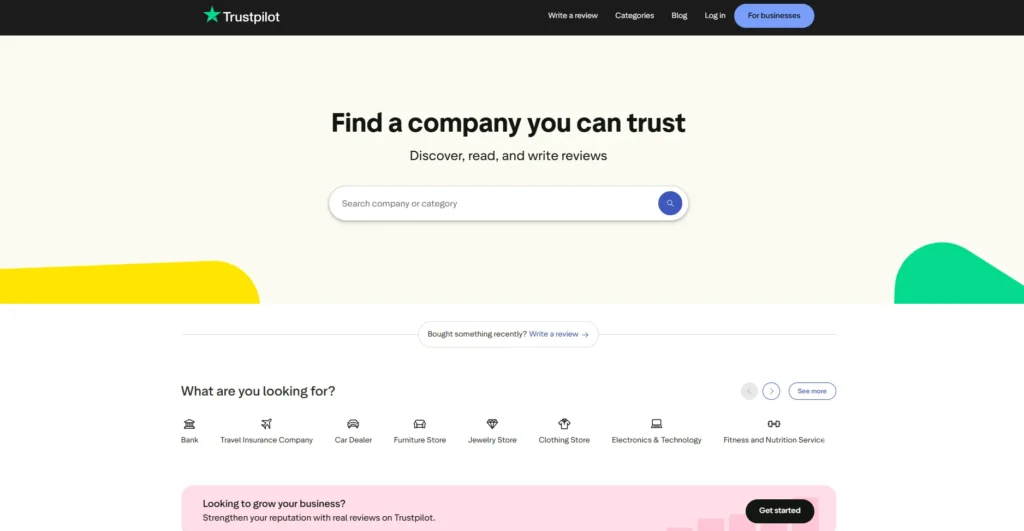
Website: https://www.trustpilot.com
Trustpilot is a global leader in collecting, verifying, and showcasing customer reviews. Businesses can automate review invitations and use customizable widgets to display testimonials on their sites. Trustpilot’s fraud protection systems ensure genuine feedback and provide consumer confidence. Its dashboard gives access to analytics and monitoring tools to help businesses respond to trends and enhance their reputation.
With options for both free and paid plans, Trustpilot matches the needs of startups and established brands alike, making it popular in the e-commerce sector.
Key Features:
- Automated review collection and management
- Verified reviews with fraud prevention
- Embeddable review widgets
- Analytics and reporting dashboard
- Review response and alerts
- Free tier for basic use
Pricing: Free basic plan; paid options for enhanced analytics and branding.
Pros & Cons:
| Pros | Cons |
| Widely trusted by consumers | Some advanced features require a subscription |
| Verified, fraud-protected feedback | Widgets are limited in the free plan |
| Customizable widgets and analytics | |
| Scalable for e-commerce |
8. Yext
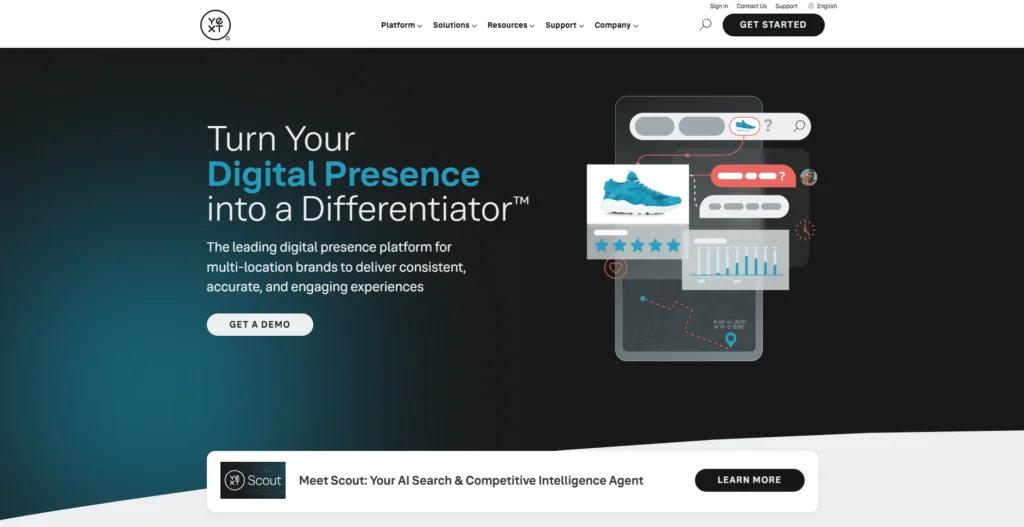
Website: https://www.yext.com
Yext specializes in business listings management and online reputation, ensuring your business information is always accurate across major directories. With its centralized dashboard, users can promptly respond to reviews and update business details in real-time across platforms.
Yext’s SEO tools and local SEO tactics improve search visibility, attracting more customers to both online and physical locations. Its analytics and reporting features help identify trends and areas for improvement. Suitable for businesses of all sizes, especially those with multiple locations or franchises.
Key Features:
- Listings management across dozens of directories
- Centralized reviews dashboard and alerts
- Real-time business information updates
- Local SEO tools
- Analytics and reporting suite
- Multi-location management
Pricing: Custom pricing (based on locations and features needed)
Pros & Cons:
| Pros | Cons |
| Prevents inaccurate business info | Pricing not transparent |
| Effective for franchises/large SMBs | Some learning curve for new users |
| Boosts local SEO and visibility | Paid plans only for full feature set |
| Analytics for improvements |
9. BrightLocal
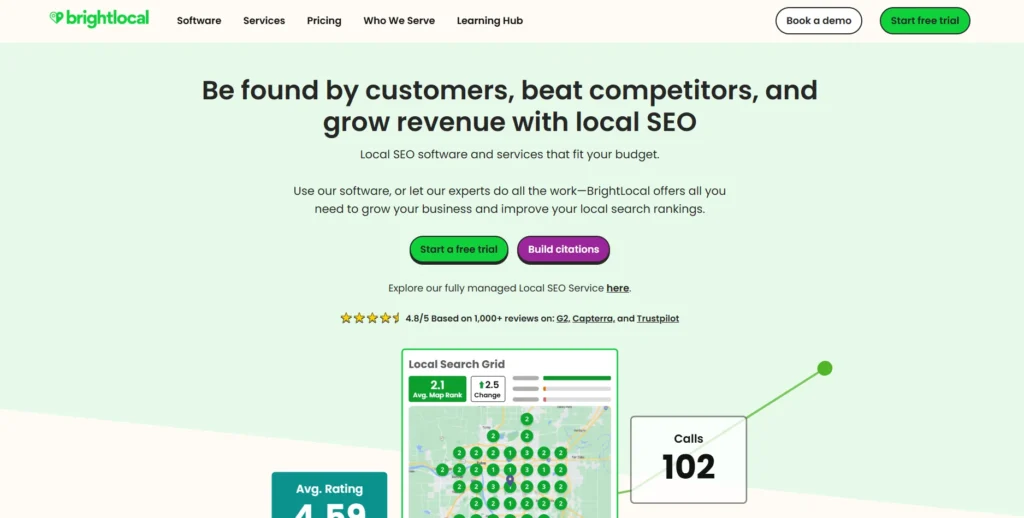
Website: https://www.brightlocal.com
BrightLocal focuses on local SEO and reputation management solutions tailored for small businesses and marketing agencies. The platform covers citation building and auditing, review tracking and reporting, as well as Google profile optimization.
Businesses can monitor performance, generate custom reports, and audit competitors from a single dashboard. BrightLocal’s affordability, combined with accessible features, makes it a smart choice for businesses aiming to improve their local search rankings and online ratings.
Key Features:
- Local SEO and citation auditing tools
- Google Business Profile optimization
- Listings management and review tracking
- White-label and customizable reports
- Competitor benchmarking
- Affordable, tiered pricing
Pricing:
- Track : $39/mo
- Manage : $49/mo
- Grow : $59/mo
Pros & Cons:
| Pros | Cons |
| Great for local SEO management | Lacks advanced workflow automation |
| Competitive pricing | Limited sentiment analysis |
| Customizable and white-label reports | |
| Suitable for agencies |
10. HiFiveStar
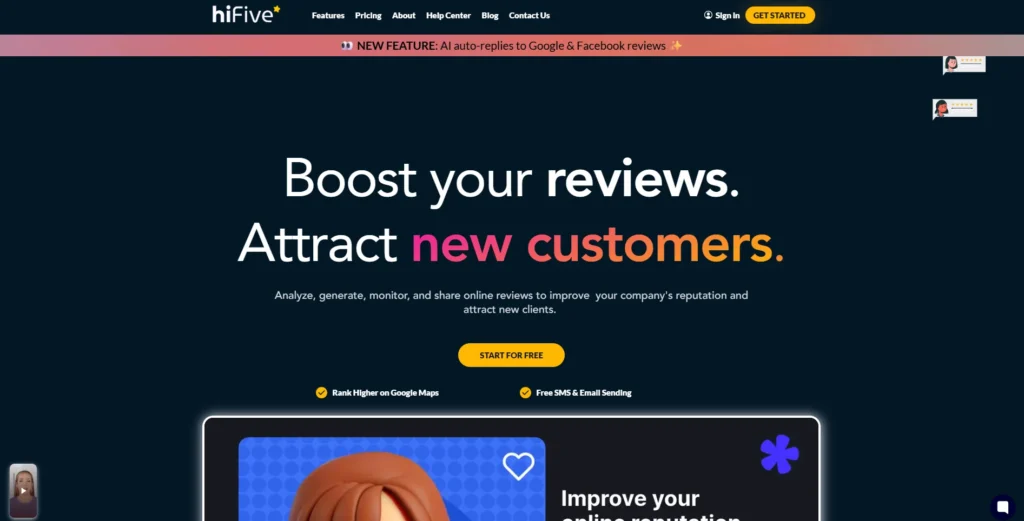
Website: https://www.hifivestar.com
HiFiveStar is a review management tool that allows businesses to send unlimited review requests via SMS, email, or WhatsApp to over 30 platforms. Its AI-powered auto-responses help engage customers in real-time, increasing review volumes and reducing missed opportunities. HiFiveStar includes real-time analytics and widgets for displaying positive feedback on your website.
The dashboard is easy for teams to use, and round-the-clock support ensures help is available when needed. The platform is suitable for all business sizes looking to automate and scale their review acquisition.
Key Features:
- Unlimited review requests (SMS, email, WhatsApp)
- Multi-platform review collection
- AI auto-reply for reviews
- Real-time analytics
- Embeddable review widgets
- 24/7 customer support
Pricing:
- Core: $39 per month
- Pro : $99 per month
- Growth: $179 per month
- Business : $249 per month
- Enterprise : $440 per month
- Unlimited : $899 per month
Pros & Cons:
| Pros | Cons |
| Multiple channels for review requests | Smaller platform ecosystem |
| Easy-to-use dashboard | AI reply sometimes generic |
| Affordable for growing businesses | Customizations can be limited |
| Quick customer support |
11. Reputation.com
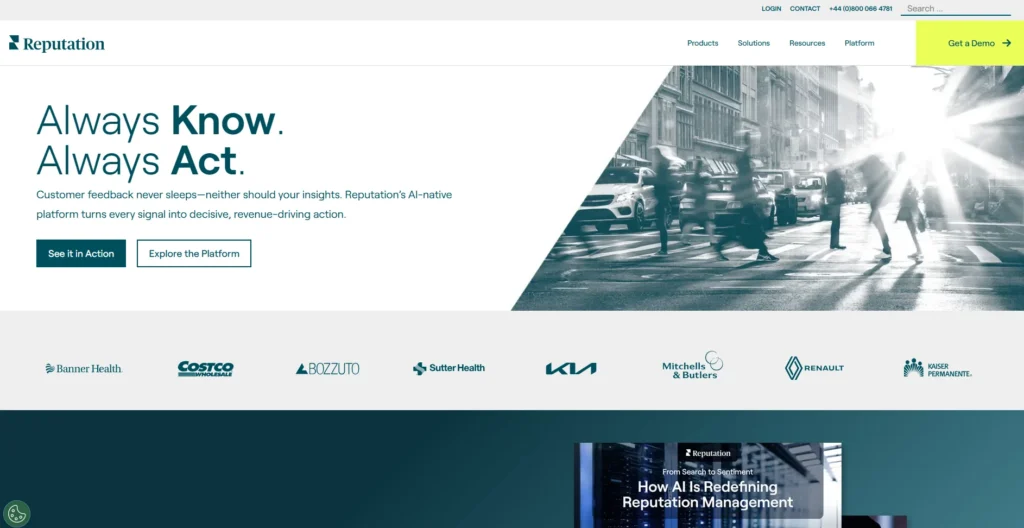
Website: https://reputation.com
Reputation.com integrates review management, social monitoring, business listings, and surveys into an all-in-one dashboard. The AI-driven analysis makes it easy to spot sentiment trends, automate responses, and benchmark against competitors. Robust analytics and comprehensive reporting help multi-location businesses manage brand health across sites.
Custom alerts and workflow tools streamline the process of responding to customer feedback and improving service standards. The platform is designed for businesses that need scalable, advanced reputation management solutions.
Key Features:
- Centralized reputation dashboard
- Review monitoring and response automation
- AI-powered sentiment and competitor analysis
- Listings management
- Survey and feedback tools
- Multi-location management features
Pricing: Custom, based on business size and needs.
Pros & Cons:
| Pros | Cons |
| Highly scalable for big brands | Not transparent on standard pricing |
| Advanced AI analytics | Can be complex for small users |
| Centralizes multiple reputation facets | |
| Benchmarking against competitors |
12. Grade.us
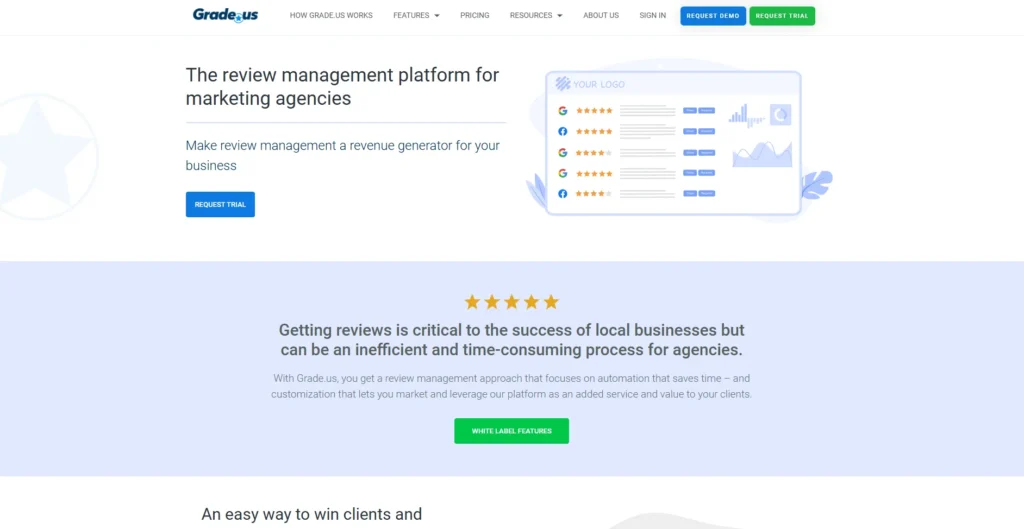
Website: https://www.grade.us
Grade.us automates the process of requesting and managing reviews across a variety of online sites. Its white-labeling makes it ideal for agencies handling multiple clients. Users get customizable review funnels, scheduled reports, and branding controls to ensure a professional storefront.
With aggregated data and analytics, it’s easy to spot trends, address issues, or highlight wins. Grade.us integrates simply with existing marketing workflows and boasts straightforward onboarding and support.
Key Features:
- Automated, multi-platform review requests
- White-labeling for agencies
- Customizable review funnels
- Scheduled, detailed reports
- Branding and customization options
- Integration with major review sites
Pricing:
- Solo : $110 per month
- Professional : $180 per month
- Agency : $400 per month
- Partner : $2500 per month
Pros & Cons:
| Pros | Cons |
| Great for agencies | Cost may be high for single small business |
| Simple onboarding | No advanced competitor analytics |
| Custom branding and white-label | |
| Scheduled, easy reports |
13. ReviewTrackers
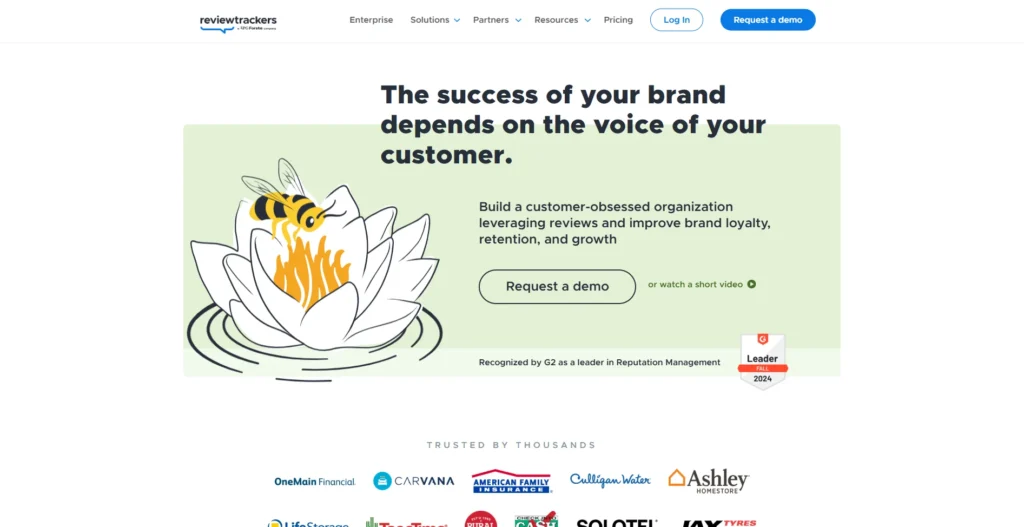
Website: https://www.reviewtrackers.com
ReviewTrackers helps businesses monitor and consolidate reviews from over 100 different websites. The automated review request campaigns and advanced reporting tools allow you to track overall sentiment and performance. The dashboard provides real-time alerts for new feedback, allowing for quick responses to customer needs.
Workflow management features help teams assign, review, and resolve customer issues efficiently. ReviewTrackers is especially suited to businesses looking to centralize operations and improve service quality based on data.
Key Features:
- Multi-site review and feedback tracking
- Automated review request campaigns
- In-depth sentiment analysis and reporting
- Real-time new review alerts
- Workflow and team management tools
- Central dashboard for consolidated insights
Pricing: Starts at $89/month. Changes According to Number of Location
Pros & Cons:
| Pros | Cons |
| Centralizes 100+ review sources | Price may be steep for micro-businesses |
| Automation for requests | Advanced tools in higher tiers only |
| Real-time and workflow features | |
| Data-driven service improvement |
14. WiserReview
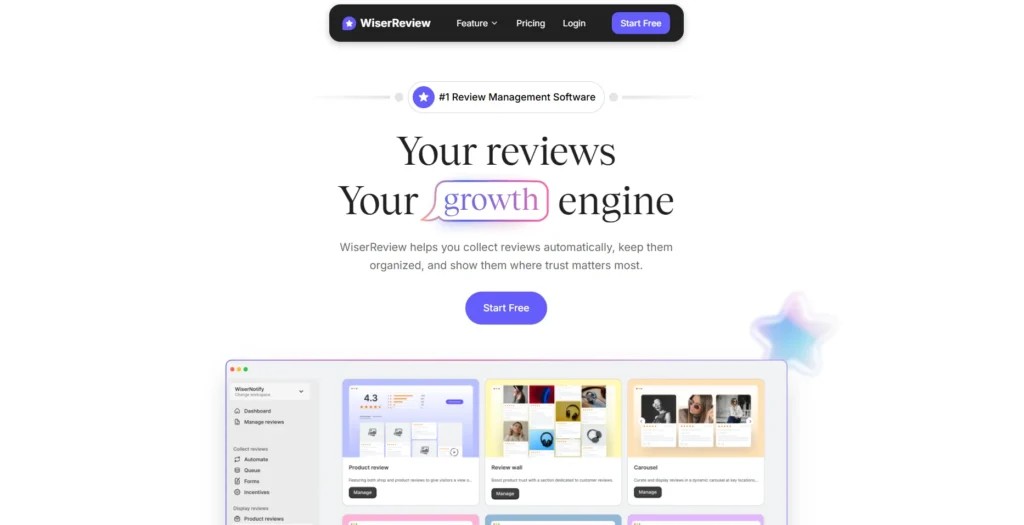
Website: https://wiserreview.com/
WiserReview provides small businesses an affordable yet comprehensive tool for review management and automation. AI-driven sentiment analysis and response suggestions help businesses stay on top of customer feedback. It offers a centralized dashboard for monitoring and sharing reviews, plus automation for review invitation campaigns.
The tool emphasizes ease of integration and rapid onboarding, making it suitable for businesses aiming for fast improvements in online reputation and customer trust. Social sharing widgets also help amplify positive testimonials to grow social proof.
Key Features:
- AI sentiment analysis and response tools
- Automated review invitation campaigns
- Central dashboard for monitoring reviews
- Social proof widgets for websites
- Fast onboarding and integration
- Affordable plans for SMBs
Pricing:
- Pro : $16 per month
- Growth : $65 per month
Pros & Cons:
| Pros | Cons |
| Low-cost, easy setup | Limited monitoring sources |
| Good for small businesses | Basic analytics |
| Automation for review requests | Not for complex workflows |
| Social widgets for amplification |
15. Rannkly
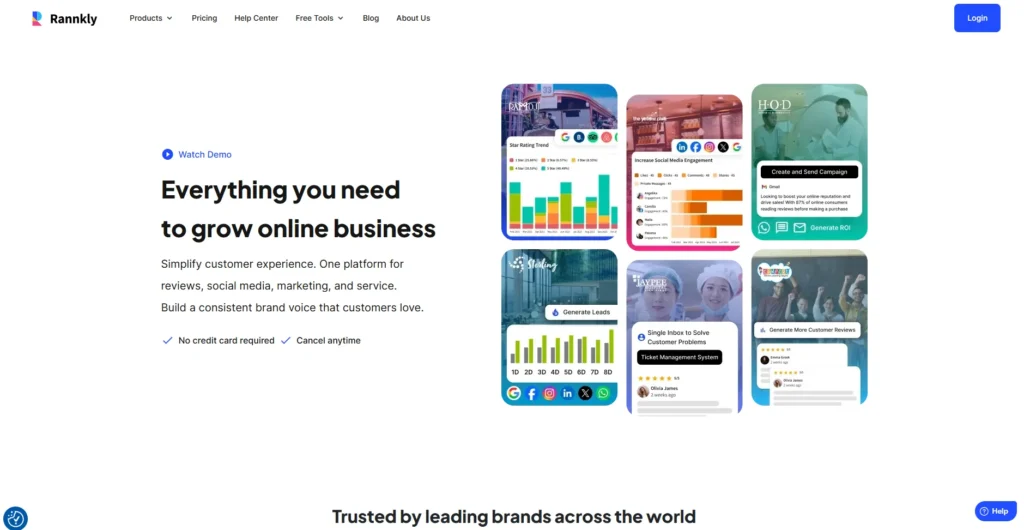
Website: https://www.rannkly.com
Rannkly is an integrated platform for managing online reputation, cross-platform reviews, and social media in one place. The system automates review requests and monitoring, offers detailed analytics, and streamlines customer communications. Rannkly’s dashboard enables businesses to quickly address negative feedback, maintain consistent branding, and gather key insights for improvement.
It caters especially well to small and mid-sized businesses, prioritizing simplicity and efficiency without sacrificing core features. Its affordable pricing makes professional-grade ORM accessible to more businesses.
Key Features:
- Review monitoring and request automation
- Multi-channel social media management
- Advanced analytics and sentiment tracking
- Unified customer communication tools
- Brand consistency management
- Easy onboarding and integration
Pricing: Custom Pricing . Contact Sales
Pros & Cons:
| Pros | Cons |
| Integrated social and reputation tools | Limited to English/Hindi UI |
| Affordable for SMBs | Fewer integrations than global giants |
| Easy-to-use and efficient dashboard | Best suited for small–mid businesses |
| Automation for reviews and communication |
How ORM Tools Help Boost SEO for Small Businesses
- Maintain consistent NAP (Name, Address, Phone) across directories to boost local rankings.
- Generate more positive reviews, a key factor in Google’s local SEO algorithm.
- Enable rich snippets (star ratings) in search results to improve click-through rates.
- Provide fresh, user-generated content that signals ongoing business activity to search engines.
- Embed SEO-optimized review widgets to enhance on-site content and engagement.
- Track brand mentions across the web for PR management and potential backlink opportunities.
- Encourage timely responses to reviews, increasing relevance and local authority signals.
Conclusion
Your business’s online reputation is one of your most valuable assets, and protecting it is essential for long-term growth. With the right Online Reputation Management Tools, you can stay ahead of negative feedback, amplify glowing reviews, and transform your customers into loyal advocates.
Whether you need something simple and budget-friendly or a powerful, feature-rich platform, these 15 reputation management solutions offer the versatility and support your small business needs in 2025. Take action now: embrace the right ORM tool, and unlock new levels of customer trust, visibility, and growth for your brand.
FAQs
1. Why does my small business need online reputation management?
It builds trust, attracts customers, and helps manage negative feedback.
2. How do I choose the best ORM tool?
Compare features, pricing, and ease of use based on your business needs.
3. Are there free options for managing my reputation?
Yes, Google Alerts is free, but paid tools offer more features.
4. Can ORM tools help with bad reviews?
Yes, they provide real-time alerts and easy ways to reply professionally.
5. Should I use more than one tool?
One is usually enough, but combining tools can offer broader coverage.
